牛津译林版(2019)必修 第二册Unit 4 Exploring literature Grammar and usage Modal verbs 情态动词 课件(共21张PPT,内镶嵌视频)
文档属性
| 名称 | 牛津译林版(2019)必修 第二册Unit 4 Exploring literature Grammar and usage Modal verbs 情态动词 课件(共21张PPT,内镶嵌视频) |

|
|
| 格式 | pptx | ||
| 文件大小 | 24.1MB | ||
| 资源类型 | 教案 | ||
| 版本资源 | 牛津译林版(2019) | ||
| 科目 | 英语 | ||
| 更新时间 | 2024-03-14 00:00:00 | ||
图片预览

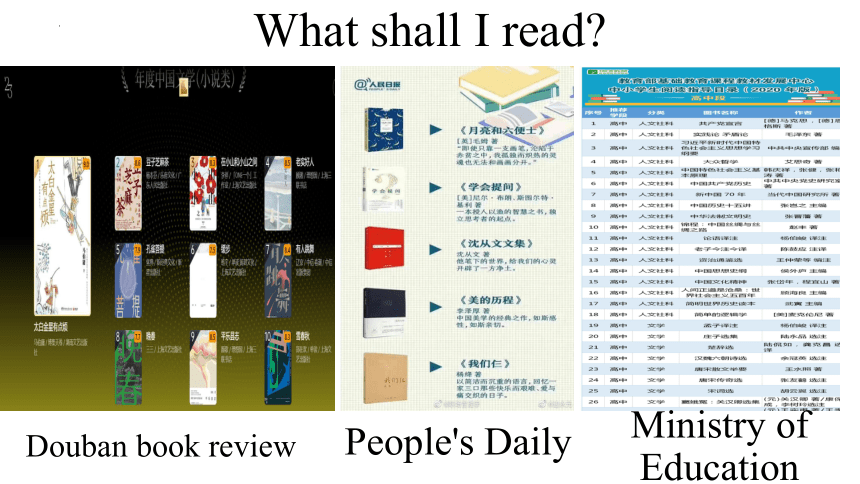
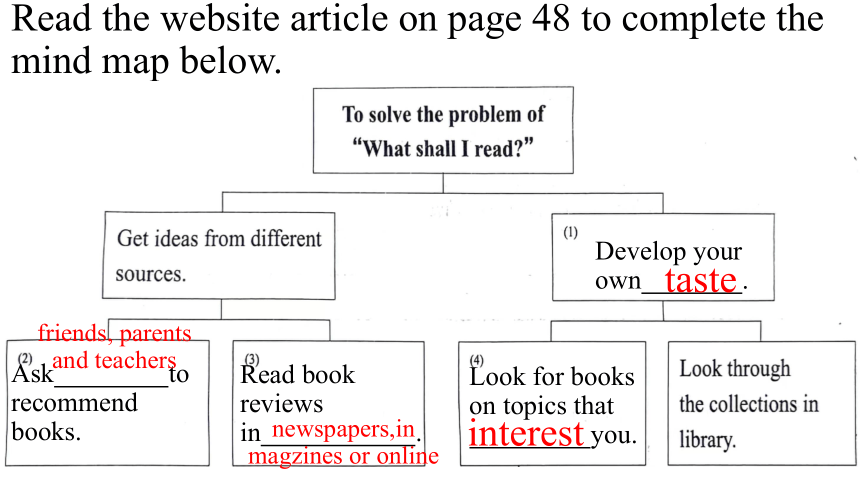
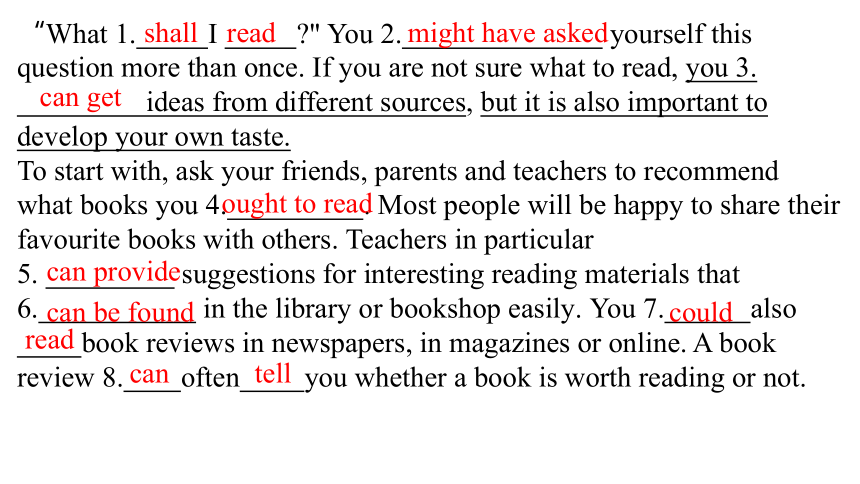
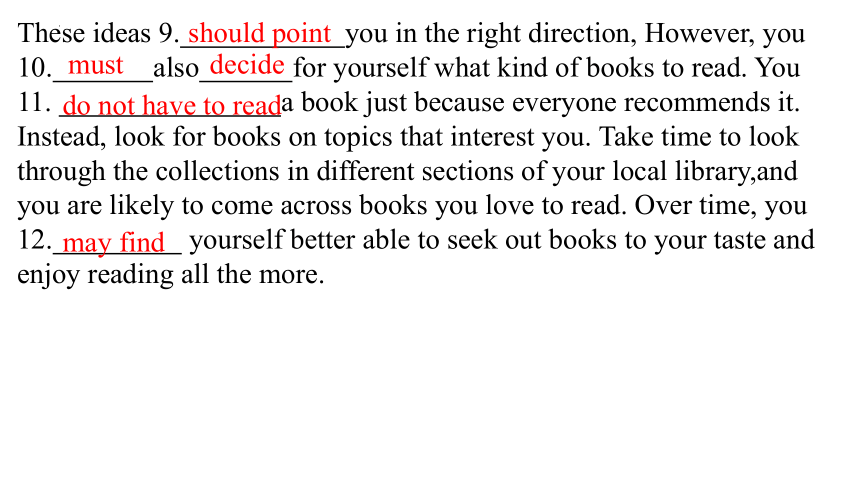
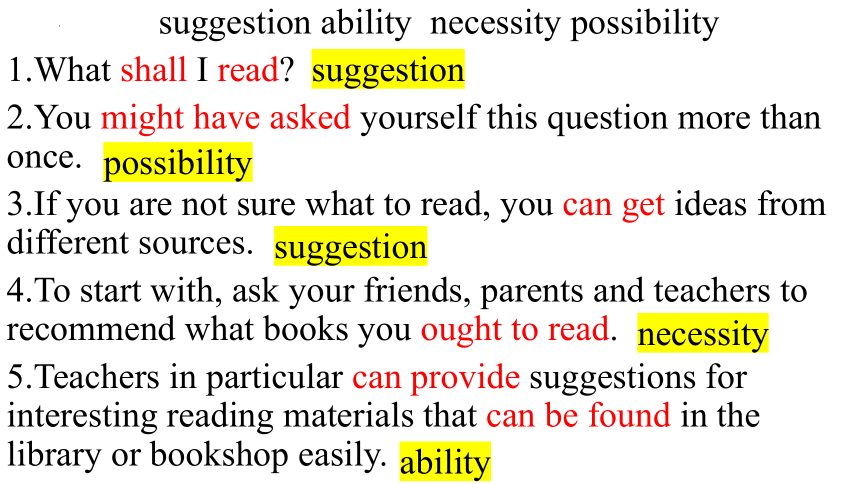
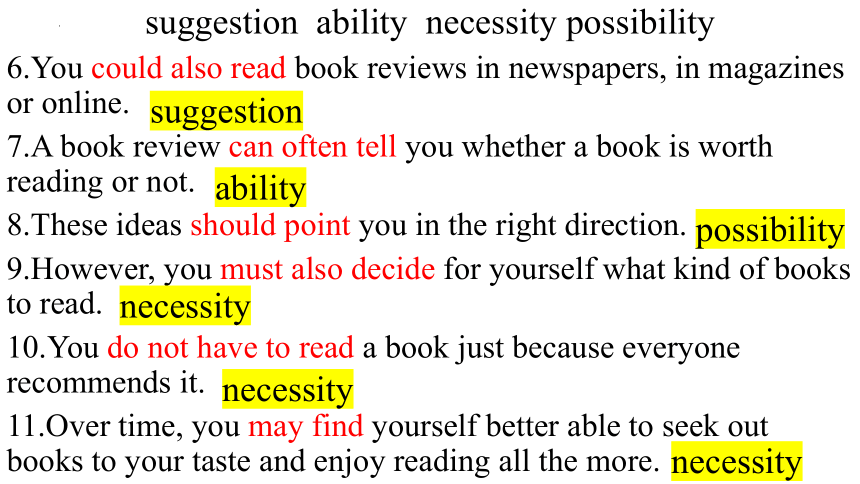
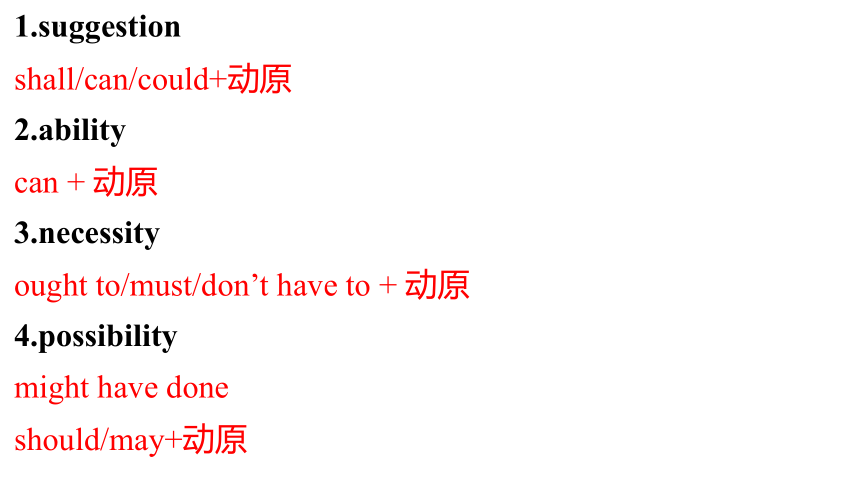
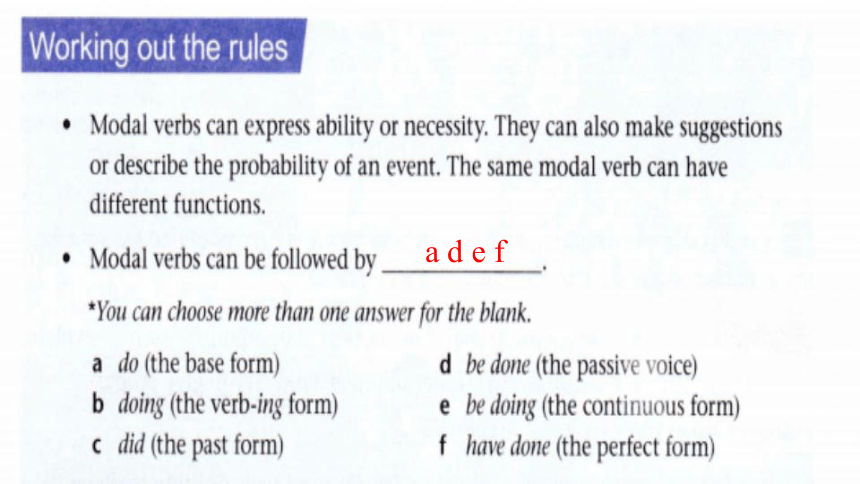
文档简介
(共21张PPT)
Modal verbs
What shall I read
Douban book review
People's Daily
Ministry of Education
Read the website article on page 48 to complete the mind map below.
Look for books on topics that
you.
Ask to recommend books.
Read book reviews in .
Develop your own .
taste
friends, parents
and teachers
newspapers,in magzines or online
interest
“What 1. I " You 2. yourself this question more than once. If you are not sure what to read, you 3.
ideas from different sources, but it is also important to develop your own taste.
To start with, ask your friends, parents and teachers to recommend what books you 4. . Most people will be happy to share their favourite books with others. Teachers in particular
5. suggestions for interesting reading materials that
6. in the library or bookshop easily. You 7. also
book reviews in newspapers, in magazines or online. A book review 8. often you whether a book is worth reading or not.
shall read
might have asked
can get
ought to read
can provide
can be found
could
read
can
tell
These ideas 9. you in the right direction, However, you
10. also for yourself what kind of books to read. You
11. a book just because everyone recommends it. Instead, look for books on topics that interest you. Take time to look through the collections in different sections of your local library,and you are likely to come across books you love to read. Over time, you 12. yourself better able to seek out books to your taste and enjoy reading all the more.
should point
must decide
do not have to read
may find
suggestion ability necessity possibility
1.What shall I read
2.You might have asked yourself this question more than once.
3.If you are not sure what to read, you can get ideas from different sources.
4.To start with, ask your friends, parents and teachers to recommend what books you ought to read.
5.Teachers in particular can provide suggestions for interesting reading materials that can be found in the library or bookshop easily.
suggestion
possibility
suggestion
necessity
ability
suggestion ability necessity possibility
6.You could also read book reviews in newspapers, in magazines or online.
7.A book review can often tell you whether a book is worth reading or not.
8.These ideas should point you in the right direction.
9.However, you must also decide for yourself what kind of books to read.
10.You do not have to read a book just because everyone recommends it.
11.Over time, you may find yourself better able to seek out books to your taste and enjoy reading all the more.
suggestion
ability
possibility
necessity
necessity
necessity
1.suggestion
shall/can/could+动原
2.ability
can + 动原
3.necessity
ought to/must/don’t have to + 动原
4.possibility
might have done
should/may+动原
a d e f
情态动词
1.本身有词义,不能单独作谓语。
2.与动词原形构成谓语。
3.表示说话人的情绪、态度、语气。
常见情态动词
1.只做情态动词
may(过去式might) must
2.可做情态动词/实义动词(有人称数的变化,后不加动词原形)
can(过去式could)-能够 need-需要 dare-敢于
3.可做情态动词/助动词(构成时态、语态、疑问句、否定句)
will(过去式would) shall should
4.具有情态动词特征:have to,used to,ought to
情态动词+have done的用法
1.can/could/may/might have done表推测过去可能发生的事情。
Tom can have been hurt seriously in the car accident.
2.must have done 表推测过去一定发生的事,“一定做过”
Linda must have gone to work by bus, because her bike is still there.
3.should/ought to have done(语气强烈) “本应该做未做”虚拟语气
You should have been more careful in this experiment.
4.needn’t have done “本没必要做却做了”虚拟语气
I dressed very warmly for the trip,but I needn’t have done so.The weather was hot.
情态动词+have done的用法
5.If I were you, I would do...
6.could have done 本能做却未做
7.shouldn’t have done 本不该做却做
其他
1.The news can’t be too good to her.对...太...
2.couldn’t be better 再好不过
3.I’m ready, so we might as well go now.不妨
4.need doing =need to be done 某事需要被做
5.didn't need to do 过去不必做某事, 事实上也没做
needn't have done 过去不必做某事, 但事实上做了。
6.must 非要;偏偏 mustn’t 禁止,不允许 can’t 否定推测
√
√
√
√
√
√
√
√
√
√
√
Pharses
1.不止一次
2.首先
3.特别;尤其
4.值得做某事
5.浏览
6.有可能做...
7.偶然发现
8.慢慢地
9.物色到;挑选出
10.更加
1.more than once
2.to start/begin with
3.in particular
4.be worth doing
5.look through
6.be likely to do
7.come across
8.over time
9.seek out
10.all the more
Modal verbs
What shall I read
Douban book review
People's Daily
Ministry of Education
Read the website article on page 48 to complete the mind map below.
Look for books on topics that
you.
Ask to recommend books.
Read book reviews in .
Develop your own .
taste
friends, parents
and teachers
newspapers,in magzines or online
interest
“What 1. I " You 2. yourself this question more than once. If you are not sure what to read, you 3.
ideas from different sources, but it is also important to develop your own taste.
To start with, ask your friends, parents and teachers to recommend what books you 4. . Most people will be happy to share their favourite books with others. Teachers in particular
5. suggestions for interesting reading materials that
6. in the library or bookshop easily. You 7. also
book reviews in newspapers, in magazines or online. A book review 8. often you whether a book is worth reading or not.
shall read
might have asked
can get
ought to read
can provide
can be found
could
read
can
tell
These ideas 9. you in the right direction, However, you
10. also for yourself what kind of books to read. You
11. a book just because everyone recommends it. Instead, look for books on topics that interest you. Take time to look through the collections in different sections of your local library,and you are likely to come across books you love to read. Over time, you 12. yourself better able to seek out books to your taste and enjoy reading all the more.
should point
must decide
do not have to read
may find
suggestion ability necessity possibility
1.What shall I read
2.You might have asked yourself this question more than once.
3.If you are not sure what to read, you can get ideas from different sources.
4.To start with, ask your friends, parents and teachers to recommend what books you ought to read.
5.Teachers in particular can provide suggestions for interesting reading materials that can be found in the library or bookshop easily.
suggestion
possibility
suggestion
necessity
ability
suggestion ability necessity possibility
6.You could also read book reviews in newspapers, in magazines or online.
7.A book review can often tell you whether a book is worth reading or not.
8.These ideas should point you in the right direction.
9.However, you must also decide for yourself what kind of books to read.
10.You do not have to read a book just because everyone recommends it.
11.Over time, you may find yourself better able to seek out books to your taste and enjoy reading all the more.
suggestion
ability
possibility
necessity
necessity
necessity
1.suggestion
shall/can/could+动原
2.ability
can + 动原
3.necessity
ought to/must/don’t have to + 动原
4.possibility
might have done
should/may+动原
a d e f
情态动词
1.本身有词义,不能单独作谓语。
2.与动词原形构成谓语。
3.表示说话人的情绪、态度、语气。
常见情态动词
1.只做情态动词
may(过去式might) must
2.可做情态动词/实义动词(有人称数的变化,后不加动词原形)
can(过去式could)-能够 need-需要 dare-敢于
3.可做情态动词/助动词(构成时态、语态、疑问句、否定句)
will(过去式would) shall should
4.具有情态动词特征:have to,used to,ought to
情态动词+have done的用法
1.can/could/may/might have done表推测过去可能发生的事情。
Tom can have been hurt seriously in the car accident.
2.must have done 表推测过去一定发生的事,“一定做过”
Linda must have gone to work by bus, because her bike is still there.
3.should/ought to have done(语气强烈) “本应该做未做”虚拟语气
You should have been more careful in this experiment.
4.needn’t have done “本没必要做却做了”虚拟语气
I dressed very warmly for the trip,but I needn’t have done so.The weather was hot.
情态动词+have done的用法
5.If I were you, I would do...
6.could have done 本能做却未做
7.shouldn’t have done 本不该做却做
其他
1.The news can’t be too good to her.对...太...
2.couldn’t be better 再好不过
3.I’m ready, so we might as well go now.不妨
4.need doing =need to be done 某事需要被做
5.didn't need to do 过去不必做某事, 事实上也没做
needn't have done 过去不必做某事, 但事实上做了。
6.must 非要;偏偏 mustn’t 禁止,不允许 can’t 否定推测
√
√
√
√
√
√
√
√
√
√
√
Pharses
1.不止一次
2.首先
3.特别;尤其
4.值得做某事
5.浏览
6.有可能做...
7.偶然发现
8.慢慢地
9.物色到;挑选出
10.更加
1.more than once
2.to start/begin with
3.in particular
4.be worth doing
5.look through
6.be likely to do
7.come across
8.over time
9.seek out
10.all the more
